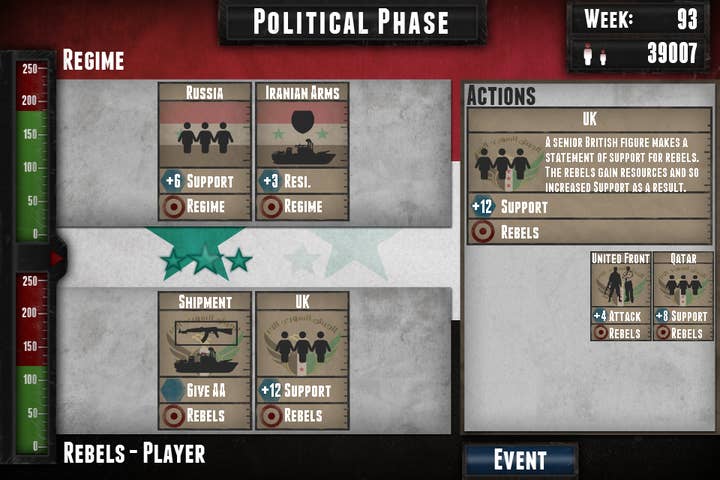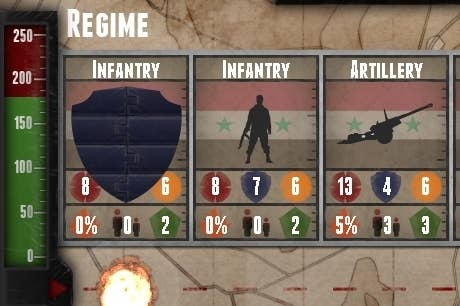War in Syria: Using Games to Understand Conflict
Why Auroch Digital made a game based on a real-world war in two weeks
Call of Duty, Medal of Honor, Battlefield, Company of Heroes, Commandos, Counter Strike; all familiar games where even non-gamers could guess the subject matter: war. If games can turn war into entertainment, then why could they not also help us to understand it?
"Joe Sacco's Palestine covered war from a different perspective to other media and showed clearly that it is not the medium that is the issue, but what you do with it"
I've had to think a lot about the relationship between games and war, as, since about two weeks ago we decided to make a new game, not about annoyed birds or farms or words or friends - not a first-person shooter but a game about the war in Syria. We've released Endgame Syria on Android and HTML5 with iOS versions to follow imminently.
Media theorist Marshall McLuhan wrote about the relationship between war and media in his book War and Peace in the Global Village, written at the height of the Vietnam war in 1968. What McLuhan wrote for TV back then is true for games now: "We are now in the midst of our first television war... The television war has meant the end of the dichotomy between civilian and military. The public is now a participant in every phase of the war, and the main actions of the war are now being fought in the American home itself."
Today, military shooters still top the charts. As I write this Call of Duty: Black Ops II has chalked up a billion dollars of sales in 15 days. Armed forces around the world used games and game concepts to push their various aims; Americas Army is the US army's first-person shooter, designed to help in recruitment. In the recent Gaza conflict the Israeli military 'gamified' the propaganda war by allowing users to get virtual military ranks and badges for social media activity such as 'liking' certain posts and articles. Iran itself, cast as the bad guys in a host of games, has been using games since 2007 to push-back against what it sees as a culture war - creating Mir Mahna, a game about the titular national hero who takes on Dutch forces in the mid-1700s. If games can turn war into entertainment, why could they not also help us to understand it?
Making a game about an ongoing war is not an easy proposition. There is a reason that most games steer clear of recognisable current events. Look at the debacle of Six Days in Fallujah, announced in 2009 when the Iraq war was still very real indeed. It soon sailed into a storm of protest and has yet to emerge.

It's easy to do a WWII game as the Nazis make great villains and everyone likes shooting 1940s fascists. So does that mean there is an invisible line we can't cross that other media forms - the written word, video, audio and photography - don't need to worry about? I don't think so. Games, with their connotations of fun and frivolity seem the opposite of how we should cover a live conflict. Comics had that connotation too. Then pioneers such Joe Sacco and his amazing work Palestine covered war from a different perspective to other media and showed clearly that it is not the medium that is the issue, but what you do with it.
We've been experimenting with this idea for a few months now, mixing news with games at gamethenews.net and we currently have games on Wired and the Huffington Post. But to show that the form has any future we needed to show we could cover the big and difficult stories. In trying to do this we face the question; why use games for this at all? Games won't (nor should they) replace traditional news forms, but they can offer something new.
Firstly they allow the user to interact with the flow of events, they are a great way to explore a dynamic situation with multiple outcomes as they let the user explore many paths in different ways. Secondly they are a medium that many people relate to as a primary media form. This means that for many people games are the natural frame they use to understand the world around them. For these reasons, I think it is worth exploring games and news and why we've chosen to make a game about the war in Syria.
"Games are a medium that many people relate to as a primary media form. For many people games are the natural frame they use to understand the world around them"
When we set about creating Endgame Syria it was apparent that this would be a huge challenge. Firstly should we take a stance on the war? Games do all the time as do their host cultures; look no further than the Taliban controversy around Medal of Honor to see this. In the Obama vs Romney debate game we produced, we didn't take sides. From that experience and as I read about the conflict in Syria, we opted to make the game from the rebel perspective to explore the challenges they have in taking on a well armed state machinery. Secondly, time was critical; it is a live situation and so we needed to make the game fast (this has taken about 2 weeks from start to finish using Game Maker) and respond to changes in the real world as we went along.
By making Endgame Syria I hope that we've encouraged some people who didn't know much about the situation in Syria, to find out more. After all, the chances are your taxes are going into this war in one form or another. We also hope that we've joined the ranks of other games that have been unafraid to take on serious subjects and cover them with sensitivity. If either of these are the case, then the risk of making something controversial rather than playing it safe and making games about shooting Nazis or grumpy avians will have been worthwhile.
Endgame Syria is out now on Android & iOS and is free to download. See gamethenews.net for more information. Tomas Rawlings is the Creative Director of the
